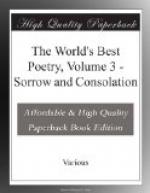But what of that? My darkened ways
Shall ring with music all the same;
To breathe my loss is more than fame,
To utter love more sweet than praise.
ALFRED, LORD TENNYSON.
APRES.
Down, down, Ellen, my little one,
Climbing so tenderly up to my knee;
Why should you add to the thoughts that are taunting
me,
Dreams of your mother’s arms clinging to me?
Cease, cease, Ellen, my little one,
Warbling so fairily close to my ear;
Why should you choose, of all songs that are haunting
me,
This that I made for your mother to hear?
Hush, hush, Ellen, my little one,
Wailing so wearily under the stars;
Why should I think of her tears, that might light
to me
Love that had made life, and sorrow that mars?
Sleep, sleep, Ellen, my little one!
Is she not like her whenever she stirs?
Has she not eyes that will soon be as bright to me,
Lips that will some day be honeyed like hers?
Yes, yes, Ellen, my little one.
Though her white bosom is stilled in the grave,
Something more white than her bosom is spared to me,—
Something to cling to and something to crave.
Love, love, Ellen, my little one!
Love indestructible, love undefiled,
Love through all deeps of her spirit lies bared to
me,
Oft as I look on the face of her child.
ARTHUR JOSEPH MUNBY.
THE FAIREST THING IN MORTAL EYES.
Addressed to his deceased
wife, who died in childbed at the
age of twenty-two.
To make my lady’s obsequies
My love a minster wrought,
And, in the chantry, service there
Was sung by doleful thought;
The tapers were of burning sighs,
That light and odor gave:
And sorrows, painted o’er with tears,
Enlumined her grave;
And round about, in quaintest guise,
Was carved: “Within this tomb there lies
The fairest thing in mortal eyes.”
Above her lieth spread a tomb
Of gold and sapphires blue:
The gold doth show her blessedness,
The sapphires mark her true;
For blessedness and truth in her
Were livelily portrayed,
When gracious God with both his hands
Her goodly substance made.
He framed her in such wondrous wise,
She was, to speak without disguise,
The fairest thing in mortal eyes.
No more, no more! my heart doth faint
When I the life recall
Of her who lived so free from taint,
So virtuous deemed by all,—
That in herself was so complete
I think that she was ta’en
By God to deck his paradise,
And with his saints to reign,
Whom while on earth each one did prize
The fairest thing in mortal eyes.
But naught our tears avail, or cries;
All soon or late in death shall sleep;
Nor living wight long time may keep
The fairest thing in mortal eyes.




